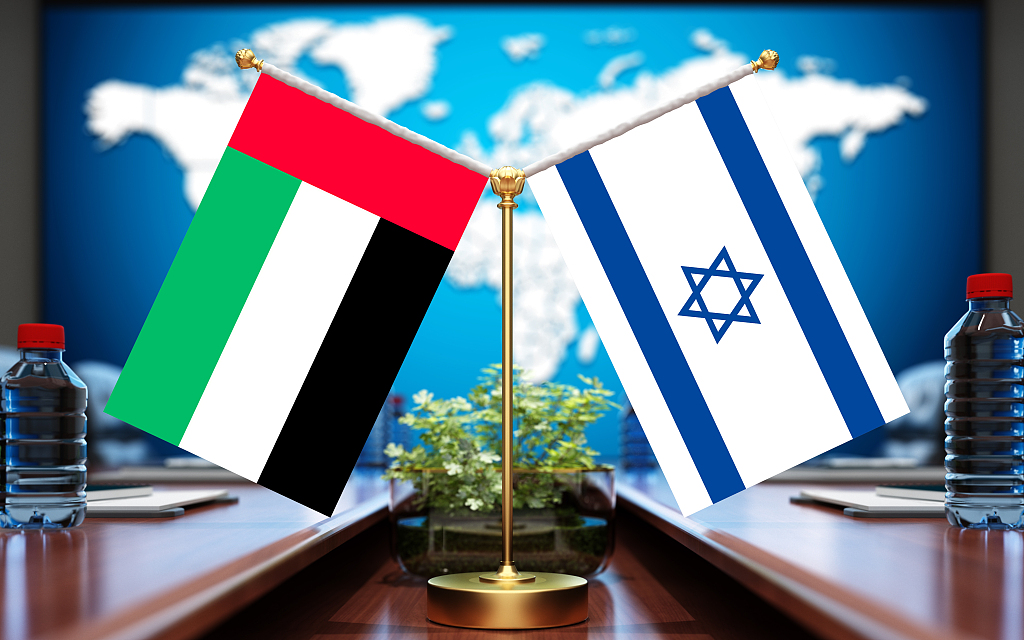?Limited rapprochement between UAE and Israel
- By Jin Liangxiang
 0 Comment(s)
0 Comment(s) Print
Print E-mail China.org.cn, December 23, 2021
E-mail China.org.cn, December 23, 2021

Last week, Israeli Prime Minister Naftali Bennett made his first official visit to the United Arab Emirates (UAE), in a bid to strengthen the two countries' recently-established bilateral ties.
The much-anticipated visit came some 14 months after Israel and the UAE normalized their ties, marking another milestone in Israel's engagement with the Arab world. According to Bennett, the visit intended to deepen the cooperation between the two in all aspects.
In August 2020, the U.S., the UAE, and Israel signed Abraham Accord, making the UAE the third Arab country to formally recognize Israel and establish diplomatic relations. Following the signing, relations between the two countries have been moving forward quickly, with both establishing embassies in each other's country. Bennett's visit to the UAE last week can therefore be seen as a natural extension of their ties in the past 16 months.
The engagement between the UAE and Israel is significant for both the countries and the region as a whole. For the UAE, the cooperation with Israel in science and technology will help it achieve new development, and therefore enhance its position in the region. Likewise, by establishing normal relations with the UAE, Israel has proved its capability in breaking through the Arab front of isolation toward it, making inroads into the central Arabian Peninsula for the first time in modern history. Moreover, hi-tech products produced by Israel will likely find a major market in the UAE, and its geopolitical influence is likely to grow in stature as well.
Despite such game-changing bilateral progress between the UAE and Israel, their rapprochement is still limited, as substantial differences between them remain.
Firstly, the UAE will have to take into consideration the emotions of its Arab brothers. Normalizing relations with Israel is the trend, but the public and some Arab countries at official levels still regard diplomatic relations with Israel as a betrayal to the nationhood of Palestine, an Arab brother. That is why the majority of Arab countries still reject normalizing relations with Israel even under the U.S.' push otherwise. As such, the UAE needs some time to digest the potential dissatisfaction of the Arab public. Moreover, the UAE has to face challenges in terms of morale due to Israel's military operations in Arab territories.
Secondly, the UAE has a significantly different outlook and agenda regarding Iran's nuclear program and other major regional issues. One of the biggest goals behind Israel's cozying up with Arab countries and the UAE is to form an alliance to counter Iran. Naftali Bennett's latest visit to the UAE in particular was intended to rally Arab countries to sabotage the ongoing negotiation in Vienna on the resumption of the Iran nuclear talks, or Joint Comprehensive Plan of Action (JCPOA), which began in 2015.
It is true that the UAE, like other Arab countries, considers Iran as a threat, and the UAE continues to have territorial disputes with Iran over three small islands in the Gulf. Despite these concerns, it seems that the UAE attaches more importance to the economic benefits of better ties with Iran. Iranian companies lack direct channels to the outside world due to U.S. sanctions, and therefore, many of them choose to set up bank accounts in the UAE, making the latter a business hub for Iranian commerce and benefitting the UAE due to its special position.
Moreover, any military action toward Iran will force the UAE to react on the frontline, which is the last thing the UAE wants because of economic and security concerns.
Ultimately, the UAE prefers to uphold rational engagement with Iran, as apparent from its actions over the past year. Ahead of Bennett's visit to the UAE, Sheikh Tahnoon bin Zayed, the UAE's national security advisor, went to Tehran and met Iranian President Ebrahim Raisi, which could be interpreted as an effort to maintain relations with Iran in response to the changing regional circumstances. The UAE understands that even without resumption of the JCPOA, it will have to normalize its relations with Iran and ensure its security by contributing to the construction of regional security mechanisms that include Iran.
The UAE has showcased its diplomatic flexibility and pragmatism in its efforts to normalize its ties with Israel. However, their differences in many areas are bound to lead to a limited rapprochement between the two.
Jin Liangxiang is Senior Research Fellow with the Center for West Asian and African Studies, Shanghai Institutes for International Studies. For more information please visit:
http://www.ccgp-fushun.com/opinion/jinliangxiang.htm
Opinion articles reflect the views of their authors, not necessarily those of China.org.cn.
If you would like to contribute, please contact us at opinion@china.org.cn.





